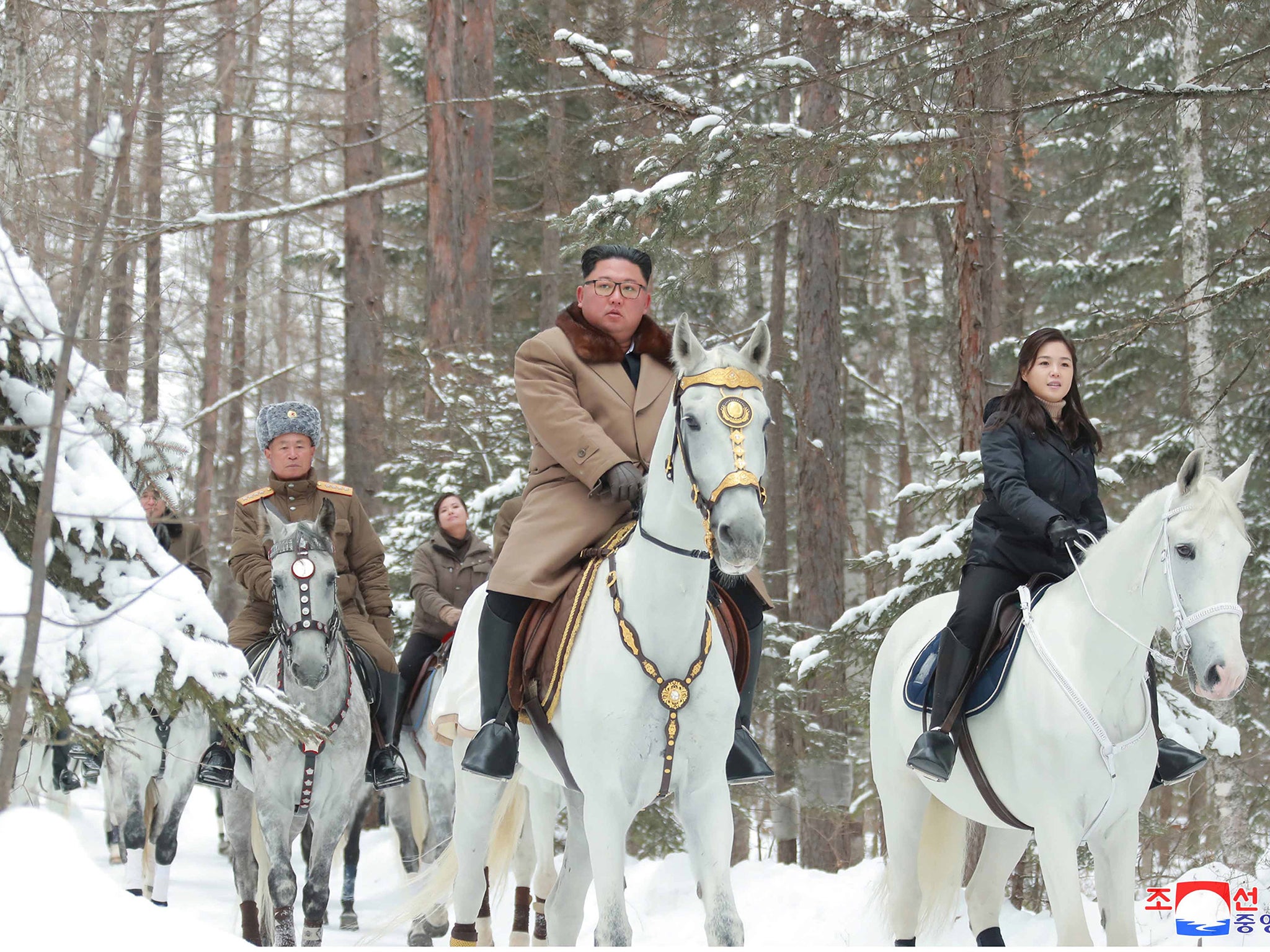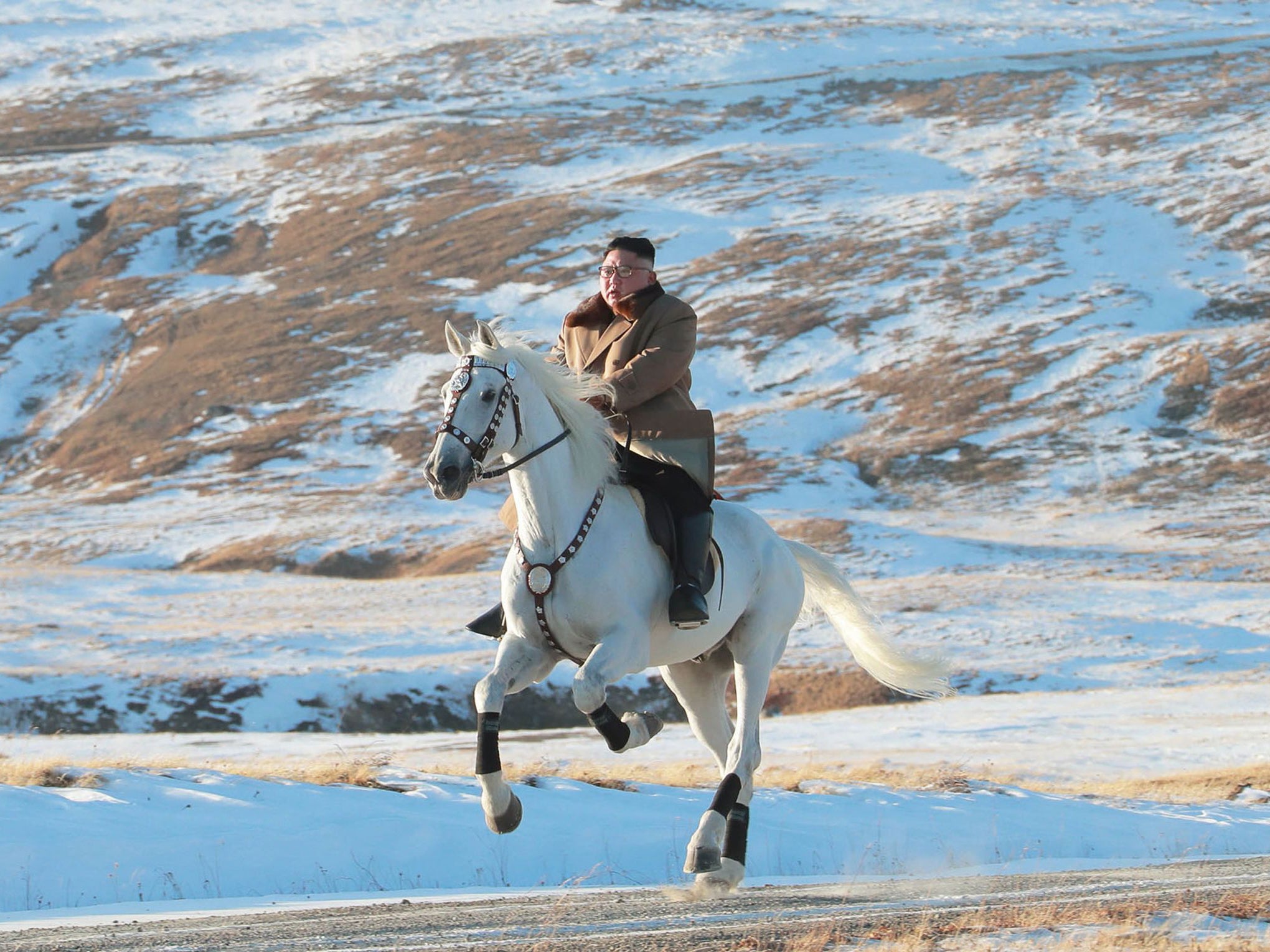North Korea hints at major policy decision as Kim Jong-un takes to the mountains on his horse
Experts say announcements do not bode well for relations with US

Your support helps us to tell the story
From reproductive rights to climate change to Big Tech, The Independent is on the ground when the story is developing. Whether it's investigating the financials of Elon Musk's pro-Trump PAC or producing our latest documentary, 'The A Word', which shines a light on the American women fighting for reproductive rights, we know how important it is to parse out the facts from the messaging.
At such a critical moment in US history, we need reporters on the ground. Your donation allows us to keep sending journalists to speak to both sides of the story.
The Independent is trusted by Americans across the entire political spectrum. And unlike many other quality news outlets, we choose not to lock Americans out of our reporting and analysis with paywalls. We believe quality journalism should be available to everyone, paid for by those who can afford it.
Your support makes all the difference.North Korean leader Kim Jong-un was back on his white horse, inspecting “revolutionary battle sites” in knee-high virgin snow on a sacred mountain, state media announced on Wednesday, as Pyongyang foreshadowed a major policy decision later this month.
The images of Mr Kim on horseback, returning to Mount Paektu after a similar visit in October, were high on symbolism.
But it was a second, more dryly worded announcement on Wednesday that was at least as significant.
The presidium of the Political Bureau of the Central Committee of the Workers’ Party of Korea decided to convene the fifth Plenary Meeting of the seventh Central Committee of the Workers’ Party of Korea in the latter part of December, the Korean Central News Agency said, “to discuss and decide on crucial issues in line with the needs of the development of the Korean revolution and the changed situation at home and abroad”.
Put simply, after giving the US until the end of the year to change its approach to denuclearisation talks and warning North Korea would follow a “new path”, Mr Kim appears to have made his decision on what that path should be, experts said.
Mr Kim announced a halt to nuclear and intercontinental ballistic missile tests in April 2018 as North Korea and the United States pursued diplomacy.
But his regime warned last month there was no reason to stick to previous commitments, saying Pyongyang felt “betrayed” by a US decision to continue with joint air drills with South Korea.
Cheong Seong-chang, a North Korea specialist at South Korea’s Sejong Institute, said the announcements taken together did not bode well for relations with Washington.
“Kim Jong-un is displaying strong hostility and a strong will to resist the United States in order to gather support ahead of announcing the ‘new path,’” he said.
“The party plenum is likely to see a strong criticism against the US and South Korea. North Korea is highly likely to announce the discontinuation of nuclear talks and the establishment of North Korea’s status as a nuclear power.”
Ankit Panda, a North Korea expert at the Federation of American Scientists, said a Workers’ Party plenum was more significant than Mr Kim’s much-anticipated New Year’s Day speech.
The last plenum took place in April, when Mr Kim called on the US to make a “bold decision” while threatening to put his country on a “new path”.
“Presumably we will learn what happens next,” he tweeted, suggesting important new policy guidance, with the possibility that may involve a return to the byungjin policy of simultaneous military and economic development.

On Tuesday, North Korea warned time was running out before its year-end deadline and threatened an unwelcome Christmas gift for the US, but experts said its decision may have already been made.
“The door has closed. We’re just waiting to see what happens next,” Mr Panda tweeted.
Mount Paektu is enshrined in North Korean revolutionary myth as the birthplace of Mr Kim’s father, Kim Jong-il, and a key military base for his grandfather, Kim Il-sung, during the struggle against Japanese colonial rule.
The third-generation leader’s visit to the peak read like an attempt to burnish his leadership credentials and prepare the country for a policy shift. Previous visits to the mountain have come before major decisions.
“It is of remarkable historic significance that Kim Jong-un, the great leader of our revolution who opens up the period of a great leap for the development of the revolution, personally left the sacred trace in the revolutionary battle sites in [the] Mount Paektu area, the source of the lifeline of the revolution and inexhaustible patriotism, through knee-high virgin snow,” KCNA reported.
Mr Kim said his tour had “hardened his resolution to defend the gains of the revolution”.
He said Korean people needed to have a proper understanding of the “revolutionary traditions” of Mount Paektu, and claimed this would help them “demonstrate the country’s dignity and honour before the world”.
This spirit, he added, would enable them to overcome “the unprecedented blockade and pressure imposed by the imperialists,” and help them “get prepared for the harshness and protracted character of our revolution”.
The Washington Post
Subscribe to Independent Premium to bookmark this article
Want to bookmark your favourite articles and stories to read or reference later? Start your Independent Premium subscription today.
Join our commenting forum
Join thought-provoking conversations, follow other Independent readers and see their replies
Comments